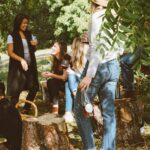Alchemy – in its most plain terms – is “the process of taking something ordinary and turning it into something extraordinary”. I can’t think of a more fitting way to describe kelp and its powerful potential!
Kelp? Seaweed? What is it?
Kelp is a seaweed, but not all seaweeds are kelp. Known for its long, nutrient-rich brown strands, kelp’s origins date back to the Miocene epoch (approx. 5-23 million years ago), long before humans roamed the Earth. In fact many scientists have pointed out that early hominid brains developed by eating seaweeds like kelp rich in omega-3s!
In Roman mythology, the gods would crown Salaciam, goddess of the divinity of the sea, with a flowing crown of seaweed. Greeks even used seaweed to feed their animals as early as 100 BC. In Japan kelp is documented throughout ancient literature, depicted as one of the earliest elements in Japanese cuisine. And cooked and partially eaten seaweed has been found at a 14,000 year old site in southern Chile.

Seas of Superfood
Often called the “superfood from the sea”, kelp is high in key vitamins and bioavailable minerals including vitamin A, vitamin K, folate, magnesium, calcium, and iron. Incorporating sea-greens into your diet is one of the most simple and effective ways of getting your nutrients. Kelp is also high in iodine, which supports metabolic and thyroid functions.(And has also been studied as a powerful weight loss tool!)
Kelp is not just healthy for our human bodies, but our planet’s body too. As kelp grows in the ocean, it grows via photosynthesis, converting CO2 into oxygen.
The Ecosystem and Kelp
Kelp forests are also known to be a lush oasis where many different marine species live in harmony together. The biodiversity of the ocean is enormously strengthened by the presence of kelp forests. They act as a shelter for some, a nursery to lay eggs for others, or a place to hide from predators. Otters are one species who deeply rely on kelp forests. They’re often found wrapping themselves in a bed of kelp to help them float with friends, and they benefit the kelp by eating the sea urchins off of its leaves.
Kelp forests, like the Amazon rainforest, are one of the most important natural ecosystems to consider in the fight against rising CO2 levels in our atmosphere. In fact, kelp sequesters 5x more carbon than most land-based plants because of how quickly it grows in the ocean.

Sustainable Kelp Farming
So if kelp is such an important piece of the ocean, why are we eating it? It’s important to only eat: ocean-farmed kelp. That’s right, kelp that is farmed! As in planted, grown, and harvested for food. Kelp farming is a regenerative farming practice, because by growing kelp in the ocean, it has a net positive effect. As the kelp farms grow, they sequester CO2 in the same way kelp forests do. And because growing kelp requires zero freshwater or dry land, it is considered a “zero input food source”- which is key in the context of climate change. Many climate change scientists say that if we could grow a kelp farm to the size of the Amazon Rainforest, we’d be able to remove most of the excess CO2 from our oceans in just a matter of years.
While kelp farming is one of the most sustainable sources of food on the planet, its potential does not stop there! Food is just the beginning; businesses have also started using seaweeds as bio-plastics, biofuels, animal feed, and fertilizers too.
Kelp is a seemingly ordinary sea plant but when farmed, it’s full of extraordinary opportunities for us in a time when finding solutions to our climate crisis is vital. It’s time for us to work in harmony with this miracle crop and allow it to work its alchemy.
Curious to learn (and taste) more?! Join us in real life when AKUA will join us in person for a vegan and gluten free summer BBQ.








